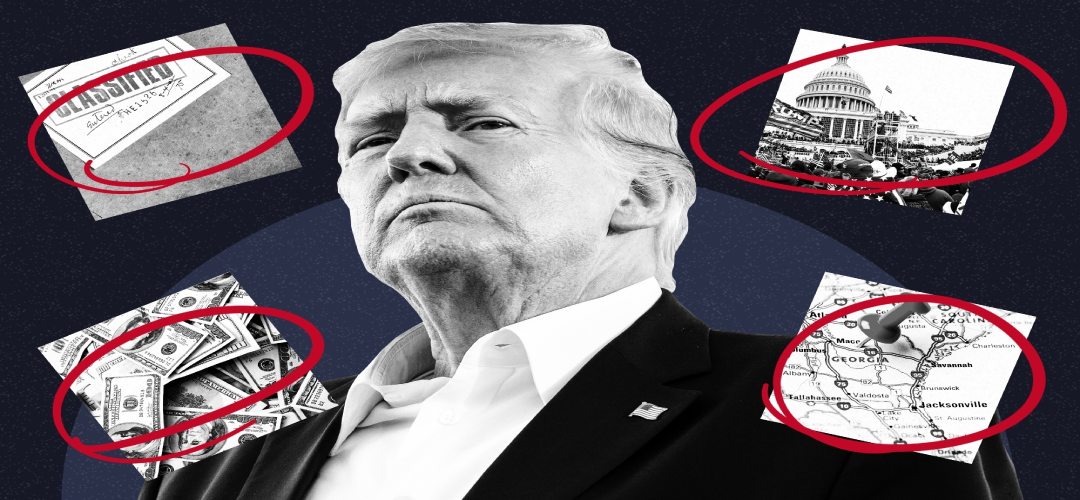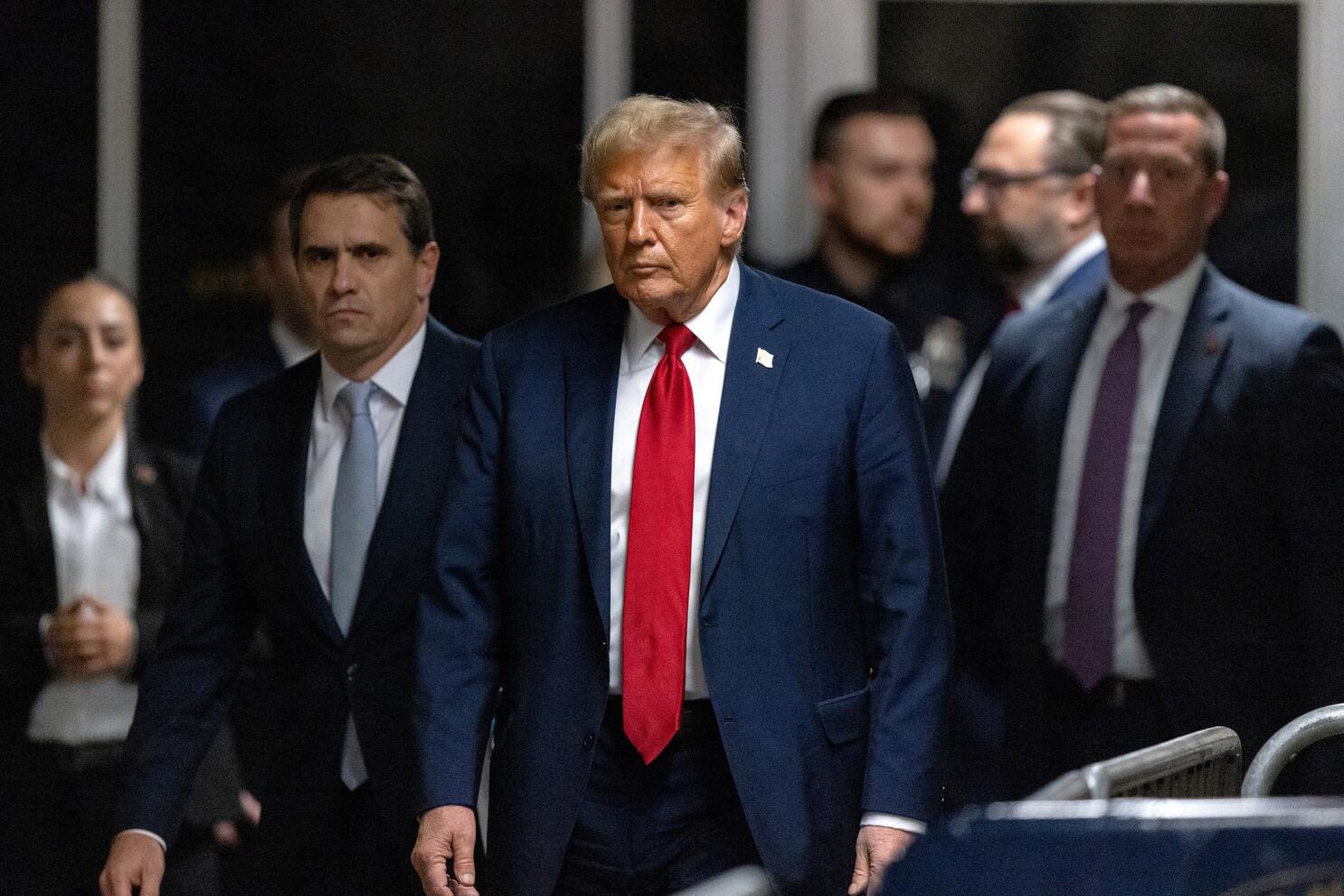Trump's Criminal Trials-Felony or Vendetta?
April 27, 2024 | Expert Insights

Over the course of five months in 2023, the Former President and running candidate Donald Trump became the first criminally indicted former president in four criminal cases and a total charge of 91 felony counts. Scheduled to stand trial in these cases, he has not pleaded guilty to the charges against him, criticising that the cases against him are politically motivated.
The defendant and the candidate wrapped into one will make for an interesting case especially in the world’s most powerful democracy. His lawyers have filed motions contesting for presidential immunity from prosecution for actions taken in office.
U.S. presidential elections are to be held on Tuesday, November 5, 2024, which gives the nation time to decide which path is best not taken.
Background
The New York State “Hush Money” Case is in the limelight as it is the one that shall see the light of the day before the November elections. A New York State Supreme Court Grand Jury voted to indict Trump on 34 counts of falsifying business records in the first degree. The trial commenced on 15 April. The case involves $130,000 paid to adult film star Stormy Daniels in exchange for her silence. Trump is charged with a low-level felony, carrying a maximum of four years in prison. He has also appealed to move the case to the U.S. Supreme Court.
The second case is the Federal Classified Documents Case. Following his departure from the White House in January 2023, Donald Trump was charged by a U.S. District Court for keeping secret National Defence Papers. FBI Agents recovered more than 100 classified documents from Trump's Florida estate at Mar-a-Lago estate, including sensitive information on the nation's nuclear program, potential military weak spots, and offensive retaliation plans in case of foreign attacks. Trump's aid, Walt Nauta, and the property manager were charged as co-conspirators in jeopardising national security. Neither Trump nor his associates have pleaded guilty, and Trump's lawyers plan to prove that the documents were securely stored.
The third case is the Federal Election Interference Case. On 1 August 2023, Trump was indicted with charges of 1 count of conspiracy to defraud the U.S. government by allegedly undermining the government's vote counting system and two counts of conspiring and obstructing the "official proceeding" of the election certification at the Capitol on 6 January. T. He is also accused of pressurising the Justice Department to back up these false claims, partaking in false electoral slate schemes, and pressuring Republican state officials to overturn the results. The indictment mentioned six co-conspirators, but only Trump was charged. The trial has been removed from the calendar as Trump appeals for immunity claims, but it was initially scheduled for 4 March 2024.
Federal prosecutors never charged Trump with inciting the pro-Trump mob violence at the Capitol but did state that Trump exploited the attack in attempts to subvert Joe Biden’s win. Trump's lawyers filed a motion to dismiss the case based on presidential immunity from prosecution for action taken during his term, which the trial court judge in Washington, D.C, threw out. On 6 February 2024, a federal appeals court rejected Trump's immunity claim, allowing the prosecution to be pursued. In saying this, he is expected to continue his appeals to the U.S. Supreme Court.
He was also banned from the formerly named Twitter in 2021 after he repeatedly tweeted his support for the 6 January rioters who stormed the U.S. Capitol building in protest at Mr Trump’s election defeat to Joe Biden.
In the Georgia Election Interference Case, the indictment details 41 charges, of which 13 are against Trump and 18 against other defendants for allegedly attempting to unlawfully overturn the 2020 election results in Georgia and weaken voters' will. 4 out of 18 defendants have pleaded guilty, and if Trump is found guilty in the case, he cannot pardon himself, especially if re-elected as president. In this situation, he would be violating a Georgia State law, not a federal law. A recorded phone call with Brad Raffensperger, Georgia's secretary of state, was one of the key incidents referred to in the indictment. In the phone call, Trump is heard asking Raffensperger to find “11,780 votes” (the difference needed to defeat Biden in Georgia). Trump is also accused of leading the Racketeering activity. 2 counts are of conspiracy to execute forgery in the first degree, and four counts relating to soliciting or impersonating public officers.
In March 2024, six out of 41 charges against Trump and the other defendants were thrown out, bringing down Trump's charges from 13 to 10. Like the Federal Election Interference Case, Trump is pursuing presidential immunity by filing a motion in the Georgia court in January this year to dismiss the case. Within the same month, one of Trump's co-defendants filed a motion accusing Fulton County District Attorney Fani Willis, the person leading the investigation, of being romantically involved with Nathan Wade, the case's lead prosecutor. Although Willis admitted to the relationship, Trump's lead attorney in the case said that she failed to provide "full transparency and necessary financial details", leading to Wade's resignment as special prosecutor in mid-March to move the case forward quickly. Wade stepping down was the condition Judge Scott McAfeefor, the overseeing judge, gave Willis and her office to keep the case.

Analysis
The defendant has a rather complex and controversial history with the media and the general public. From problematic and disrespectful statements, as heard in the Access Hollywood tape, where he boasts about "grabbing" women inappropriately, to opting out of the Paris Agreement even while the U.S. makes up about 15 per cent of global pollution, his style of political leadership has become one of the biggest scandals in U.S. history. His critics accuse him of putting his business orientation over national security interests, but at the same time, he has a considerable following among blue-collar white Americans!
While publicly, Mr Trump is brimming with confidence, the charges against him are serious if proven. In New York, falsifying business records is considered a felony instead of a misdemeanour if the defendant intended to commit or conceal a separate underlying crime. In the Federal Classified Documents Case, every count of a false statement can lead to an imprisonment of five years, and each count of willful retention of national defence data is punishable by up to 10 years. Finally, every count of conspiracy to obstruct justice, withhold documents, and damage records could result in a 20-year sentence. In saying this, can Trump run as a candidate if convicted? The answer is yes because while some states outlaw felons from running for state or local offices, the same does not apply to federal offices, and there are no limitations based on criminal or character records.
No former U.S. president has ever been indicted until Donald Trump. Former President Bill Clinton was the last president to come close to facing criminal charges. While he was impeached in December 1998 and acquitted in February 1999, the scandal did not hurt his popularity, and his approval rates kept rising.
Assessment
- While the cases have not made him a felon yet, the implications have definitely made it appear as a vendetta waged at the national level, mirroring the political landscape of the military-dominated Pakistan. That such an impression is generated in a nation that calls itself the fountainhead of liberal democracy is a real tragedy and concern.
- The slew of cases could boost his sympathy-based popularity, especially as we get closer to November. Pakistan's jailed opposition leader, Imran Khan, benefited from such a sympathy wave during the recently concluded elections in Pakistan.
- Felon, candidate, and victim all at once, there is no telling what the outcome will be, but both parties will bend backwards to protect their truths. Whether the U.S. judiciary can withstand the test of time, money, and loopholes will shape geopolitics, security, and development in this technocratic era.








Comments